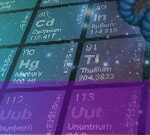NBA Quiz: 1) Name the 3 guards who were selected to the All-
NBA 1st team exactly 10 times. [The award started with the
1946-47 season.] 2) Name the 3 forwards who were selected to
the 1st team at least 10 times. Answers below.
Ronald Reagan…the Early Years
In 1954, with his screen career fading, Ronald Reagan became the
host of “General Electric Theater,” a weekly television show
which he did the introduction for as well as star in a few episodes.
G.E. sent him around the country to promote the program but he
found himself giving increasingly political speeches as the years
went on, even though he was just supposed to be a PR
spokesman. His subject was often the wastefulness and
intrusiveness of government, as well as the bankruptcy of the
“welfare state.”
By 1961-62, his speeches were fervently anti-Communist as he
expressed the unhappiness of the Republican Party”s right-wing
with the bipartisan commitment to “containment” that had
influenced American foreign policy since 1948. [For you history
buffs, the containment of George Kennan”s “Mr. X” speech.]
Reagan was actually still a registered Democrat until 1962, even
though he campaigned heavily for Eisenhower and Nixon. But as
he fine-tuned his G.E. speech, complete with conservative values,
Republican Party elders began to view him as a tremendous asset.
He was also great at connecting with the business crowd, i.e., the
big campaign contributors.
In 1964, as Barry Goldwater was about to suffer a crushing
defeat at the hands of LBJ, Goldwater himself picked Reagan to
give a national television address on October 27, just one week
before the election. Goldwater had been friends with Reagan and
saw how he could fire up the Republican base. And you can
picture Goldwater when he said, hell, I can”t give this speech as
well as you can. Why don”t you give it?
Called “A Time for Choosing,” Reagan proceeded to give a 30
minute television address that was described by veteran
Washington reporter David Broder as “the most successful
national political debut since William Jennings Bryan electrified
the 1896 Democratic Convention with his ”Cross of Gold”
speech.” Goldwater, himself, called it “the best speech of the
campaign.”
Reagan said, in part, “You and I have a rendezvous with destiny.
We can preserve for our children this last best hope of man on
earth or we can sentence them to take the first step into a
thousand years of darkness. If we fail, at least let our children,
and our children”s children, say of us we justified our brief
moment here. We did all that could be done.” [If it sounds
familiar, well, that was the beauty of Ronald Reagan. He had an
idea of where he wanted to take us from early on and he didn”t
deviate from that path.]
So with that one speech, which raised oodles of cash for the
Republican Party, Reagan was on his way to being elected
governor of California in 1966.
Of course these were chaotic times for America. The days of
“Hey, hey, LBJ, how many kids did you kill today?” and Black
Panther H. Rap Brown saying, “Take up a gun and go shoot the
enemy.”
As governor, Reagan had an opportunity to confront the protest
movement head on. The whole “Free Speech” movement
originated at Berkeley in 1964, after which it swept college
campuses across America. As Reagan aide Dinesh D”Souza
notes, “Radicals saw themselves as apostles of civil rights,
feminism, and the sexual revolution.Students and radical
professors presented their cause as a moral crusade and portrayed
their opponents as bigots and warmongers.”
But Ronald Reagan saw these folks as ingrates, “who wanted to
enjoy their country”s benefits but would not put themselves at risk
to defend its ideals.” [D”Souza]
Reagan had his well-established base, appealing to the middle and
lower-middle class electorate, many of whom were resentful of
the university students running wild. He was in the forefront of
the reaction against the counterculture…what would become
Nixon”s “Silent Majority.”
The president of the California University system was Clark Kerr.
When the whole “Free Speech” movement got started, Kerr never
once stood in its way. Take over a building, sure, go right
ahead. Disrupt classes for the kids who were there simply to get
an education, sure, go right ahead. In other words, Clark Kerr
undoubtedly would have been StocksandNews “Dirtball of the
Year” if I had had the opportunity to select him back then.
So when Reagan became governor, he attacked Kerr. Kerr, who
was lionized by the press, thought he was invincible. But at
Reagan”s first meeting with the Board of Regents, he told them
that if they fired Kerr, he would take the fallout. Kerr was fired.
Yesss!!!
Of course, Reagan”s critics always said he was out of touch.
Once he was confronted by a group of hostile students who
discounted him for having grown up in “a different world.” Said
one student condescendingly, “Today we have television, jet
planes, space travel, nuclear energy, and computers.” “You”re
right,” replied Reagan. “We didn”t have those things…we
invented them.”
And the governor was never afraid to shy away from dialogue
with the dirty, unkempt kids who needed to take a bath. Or as he
used to put it upon meeting a typical student of those days, “He
had a haircut like Tarzan, walked like Jane, and smelled like
Cheetah.”
Once to a mob of protesters he remarked, “Their signs say make
love not war, but they didn”t look as if they could do either.”
And then to a bearded man who shouted, “We are the future,”
Reagan replied, “I”m selling my bonds.”
“Those bastards at Berkeley,” he would say, and their indulgence
in “sex, drugs and treason.”
Reagan abhorred the students and their contempt for the workers,
the middle class. And many of the radicals obviously despised all
American ideals. He was always siding with those he called “the
unpampered boys of the working class,” who responded to the
call when their nation needed them, yet encountered hostility
when they returned, as in the case of Vietnam.
As governor, Reagan used to hold receptions for returning POWs
at the mansion. They would thank him for his hospitality and he
would reply, “No, we”re here to thank you for all you”ve done for
us.”
And I would venture to say that at least 60% of my readers are
equally grateful that Ronald Reagan served our country in the
manner in which he did. Happy Birthday, Mr. President.
[Sources: “Goldwater,” Barry Goldwater; “The Presidents,”
edited by Henry Graff; “American Heritage: The Presidents,”
Michael Beschloss; “A History of the American People,” Paul
Johnson; “America: A Narrative History,” Tindall and Shi;
“Ronald Reagan,” Dinesh D”Souza]
The XFL
My word, did you ever see a bigger piece of garbage in your life?
It”s pretty amazing when the whole league is in deep trouble after
airing the first two games.
The over-the-top announcing was the first obvious annoyance.
You just wanted to reach into the TV, wring their necks, and go,
“Shut Up!” And cameras on the field? It was almost like all of
those staged Palestinian rock-throwing displays. [Here kids, we
set up this pile of rocks for you. Now throw them at the Israeli
soldiers. Uh oh, you hit one. Heeere comes the bullet! Let”s get
a picture of that.]
As for Jesse Ventura, I can proudly say that I was about the first
person the day after his election as governor to call him a joke.
Now the rest of the country understands. Yoh, Jesse.you”re a
freakin” Governor, for chrissakes!
Sports Movies
In the current issue of Sports Illustrated, Jack McCallum selects
the best sports movies of all time.
1. Bull Durham 2. Raging Bull 3. Rocky 4. Hoosiers
5. Body and Soul (1947 boxing flick) 6. The Hustler
7. Chariots of Fire 8. Requiem for a Heavyweight 9. Slap Shot
10. Jerry Maguire 11. Bang the Drum Slowly 12. The Natural
13. Bad News Bears 14. North Dallas Forty 15. Breaking Away
Now Johnny Mac and I have serious disagreements with this list,
starting with “Bull Durham.” #1? Gimme a break. J Mac would
have “Raging Bull” first, with “The Hustler” #2. And there”s no
mention of “Caddyshack,” even in a list of 12 contenders for
McCallum”s Top 15! And “Eight Men Out” (the classic on the
1919 Black Sox), which is in the “Contender” category, should
easily be in the Top 15.
The “Contenders” were: Gentleman Jim, Downhill Racer, Heart
like a Wheel, Vision Quest, The Color of Money, Eight Men Out,
Everybody”s All-American, Searching for Bobby Fischer, The
Program, Without Limits, He Got Game, Love & Basketball.
My big complaint is that in the full list of 27 flicks, there is no
mention of “Grand Prix,” which could easily be #1 overall, if only
McCallum had seen it!
Now discuss amongst yourselves.
–At a high school near Hyannis, Mass., a student eating in the
cafeteria discovered a small piece of human thumb in her
sandwich when she took a bite. It turns out the thumb piece
belonged to a cafeteria worker who had severed the tip of her
thumb in a vegetable slicer earlier in the week. [Source: AP]
No word on whether it was supposed to be a tongue sandwich.
Top 3 songs for the week of 2/6/65: #1 “You”ve Lost That
Lovin” Feelin”” (The Righteous Brothers…put a few beers in me
and I”m just as good. On second thought, strike that last
comment). #2 “Downtown” (Petula Clark…StocksandNews
Female Artist of the 20th Century) #3 “The Name Game” (Shirley
Ellis…this tune has ”aged” miserably).
NBA Quiz Answers: 1) Guards: Bob Cousy, Jerry West, Michael
Jordan.all named to 10 1st teams. 2) Forwards: Karl Malone
(11), Elgin Baylor (10), Bob Petit (10). I was a little uncertain,
myself, concerning Petit as a forward. He was.
Ace: Johnnie Johnson, the leading Allied air ace of World War II
in Europe, died on Wednesday at the age of 85.
Flying the single-engine Spitfire fighter, Johnson completed more
than 1,000 missions, all without being shot down. I simply can”t
fathom that. Vice Marshal Johnson shot down 38 German planes,
exceeded only by Richard Bong of the U.S. who nailed 40
Japanese fighters. Francis Gabreski was the leading American in
Europe, blasting 28 out of the sky.
On August 19, 1942, Johnson flew in support of Canadian and
British troops during the disastrous raid at Dieppe. New York
Times columnist Richard Goldstein describes the action.
“On his fourth sortie, he went into a near-vertical dive while
pursued by a Focke-Wulf 190 fighter. He pulled out just above
ground level and then, crossing the beaches, flew into a barrage of
antiaircraft fire from a Royal Navy destroyer.” And he escaped.
Johnson also flew 4 missions over the Normandy beaches on D-
Day. So quaff a pint to a true hero, the likes of which we all
should hope we never see again.
Next Bar Chat, Wednesday.





